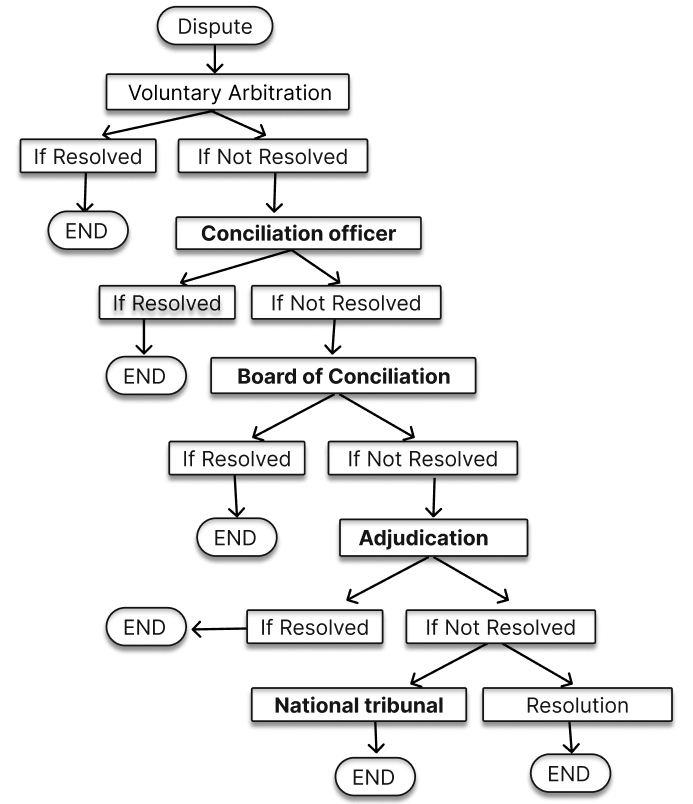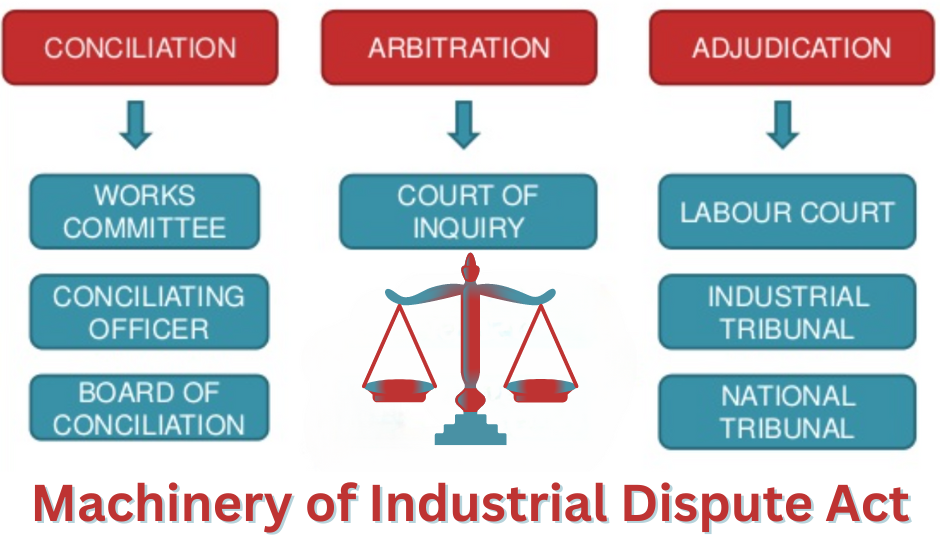Overview of Industrial Dispute Act:
In Indian laws, The Industrial Disputes Act, enacted in 1947, has been amended over the years, including notable amendments in 2010, 2015, and 2020. The most significant recent changes were part of the larger reform package in Indian labour laws under the new labour codes introduced in 2020.
These codes consolidate and update several existing labour law bare Acts, including provisions from the industrial disputes act

It is an important labour law in India that aims to address and resolve industrial disputes between employers and employees in the industrial sector. The main objective of the industrial dispute Act of 1947 is to ensure peace and harmony in the world of work by providing a legal framework for the investigation and resolution of labour disputes in labour and industrial laws. This comprehensive guide explains the scope of industrial dispute act, their importance, and their impact on industrial relations in India.
Definition of Industrial Dispute act 1947:

An industrial dispute, as defined by the Act, includes any conflict or difference of opinion between employers and employees, or between employers and employees, which is connected with the employment or lack of employment, job terms, or working conditions. Below are the features of the industrial dispute act.
Historical Context and Evolution
Before the enactment of the Industrial Act, industrial relations in India were largely unregulated, resulting in frequent lockouts and strikes in the industrial disputes act . The Commercial Code of 1929 was the first attempt to regulate industrial disputes, but it did not go far enough to provide a comprehensive framework for dispute resolution.
Post-Independence, the need for a strong mechanism for resolving industrial disputes became paramount. To bridge this gap, the Industrial Disputes Act, 1947 was introduced. Over the years, the law has been amended several times to adapt to the changing industrial landscape. Substantial changes occurred in 2010, 2015 and 2020.
Objectives of the Industrial Dispute Act
The primary objectives of the Industrial Dispute Act / bare act are:
Setting out guidelines for legal strikes and lockouts to prevent any disruptions in the smooth functioning of industries.
Implementing mechanisms to address issues related to job cuts, layoffs, and closures, ensuring job security for workers.
Upholding the principles of fairness in the treatment of workers and preventing any form of unjust labour practices under labour laws.
The Act seeks to establish a structured process for resolving disputes in order to reduce conflicts in the industrial sector.
Fostering a culture of dialogue and cooperation between employers and employees to resolve conflicts peacefully.
Important Provisions of the Industrial Disputes Act 1947
The Industrial Disputes Act of 1947 plays a crucial role in India by addressing and resolving industrial disputes to ensure peace and harmony in the industrial sector.
Key provisions of the Act given below:
Procedures for Dispute Resolution :
- Voluntary Arbitration: Recommended as the initial approach for resolving disputes. It is possible for the parties to mutually decide to arbitrate the dispute.
- Conciliation: If a resolution cannot be reached through arbitration, the disputes are directed to a conciliation officer or board.
- Adjudication: In the event that conciliation proves unsuccessful, the dispute can be referred to a labour court, tribunal, or national tribunal.
- Authority to Reach Settlements: Settlements reached during conciliation proceedings hold legal weight and are enforceable for all parties involved.

The Act regulates the conditions under which strikes and lockouts can be legally conducted:
- Act Requirement for Notice of Strike: Workers must provide notice of a walkout at least six weeks in advance of the walkout and within fourteen days of doing so.
- Prohibition of Strikes and Lockouts: Strikes and lockouts are prohibited during the pendency of conciliation proceedings and adjudication proceedings, and for a specified period after the conclusion of such proceedings.
- Illegal Strikes and Lockouts: Strikes and lockouts declared in contravention of the provisions of the Act are deemed illegal.
The Act provides guidelines for lay-offs, retrenchment, and closure in industrial dispute act.
- Lay-Off: Temporary inability of an employer to provide employment to workers due to reasons beyond control. Compensation is prescribed under the Act.
- Retrenchment as defined by the Act: A worker’s termination from employment for causes other than disciplinary action. The Act specifies conditions and compensation for retrenchment in industrial dispute act.
- Closure: The definitive shutdown of a workplace. The Act outlines procedures and compensation for affected workers.
Unfair Labour Practices:
The legislation outlines a range of practices deemed unfair for both employers and employees.
These consist of:
| For Employers | For Employees |
|---|---|
| Discriminatory actions, failure to engage in collective bargaining, and taking advantage of employees. | Participating in or endorsing illegal strikes, pressuring other employees, and impeding the lawful operations of the employer. |
The industrial disputes act compliance in India:
The Industrial Disputes Act, 1947, is a crucial legislation in India that governs the resolution of industrial disputes. Here is an outline of the compliance requirements under the Act:
Adherence to the Industrial Disputes Act is crucial for employers conducting business in India, as it promotes harmonious industrial relations and helps prevent legal consequences. It is recommended that businesses stay informed about any modifications or revisions to the Act in order to maintain continuous labour laws compliance.
Amendments and Reforms of Industrial Dispute Act:
Industrial disputes act 1947 with latest amendments
2010 Amendment: The 2010 amendment introduced changes to enhance the dispute resolution mechanism and ensure quicker justice. It aimed at making the conciliation process more effective and streamlined the functioning of labour courts and tribunals.
2015 Amendment: The 2015 amendment focused on simplifying the processes and reducing the procedural delays in adjudication. It also introduced provisions to promote better industrial relations and collective bargaining .
2020 Amendment: The 2020 amendment was a significant overhaul aimed at improving the ease of doing business while ensuring the protection of workers’ rights.
Key changes included with latest amendments
- The threshold limit for lay-offs, retrenchment, and closure provisions has been raised by the amendment.
- Employers can now offer fixed-term employment, granting flexibility in hiring while guaranteeing equal benefits for workers.
- Specific timelines have been implemented for dispute resolution to expedite the adjudication process.
Impact on Industrial Relations:
Promoting Industrial Peace
The Act has been contributory in promoting industrial peace and harmony by providing a structured mechanism for the resolution of disputes. The establishment of various authorities and the clear procedures laid out in the Act have helped in addressing conflicts effectively.
Encourage Collective Bargaining
The Act has encouraged collective bargaining by promoting the formation of works committees and recognizing the importance of conciliation and arbitration. This has led to better employer-employee relationships and has contributed to the overall improvement in industrial relations
Protecting Workers’ Rights
By defining unfair labour practices and providing mechanisms for grievance redressal, the Act has played a crucial role in protecting the rights of workers. It has also ensured job security through provisions related to lay-offs, retrenchment, and closure.

Challenges and Criticisms in Industrial Dispute Act
Complicated Processes
The intricate nature of procedures and the bureaucratic obstacles have frequently impeded the prompt resolution of conflicts.
Inflexible Clauses
Certain clauses have been deemed excessively rigid, constraining the adaptability required in a constantly evolving industrial setting.
Challenges in Implementing
Ensuring the Act’s provisions are effectively enforced continues to pose difficulties, with numerous instances of non-compliance.
Important Sections of The Industrial Dispute Act 1947
The Industrial Disputes Act, 1947, is a significant legislation in India that governs labour industrial law and deals with industrial disputes. Although the significance of different sections may vary depending on the situation, there are certain sections that are universally recognized as essential for comprehending and implementing the Act.
The causes of industrial disputes act:
Industrial disputes involve conflicts between employers and employees or groups of employees over employment terms. These disputes can stem from economic, managerial, or political/social factors.
The primary causes of industrial disputes include:
Wages and Salaries:
- Low Pay: Employees may feel their wages are inadequate compared to living costs or industry standards.
- Unequal Pay: Discrepancies in pay for employees performing similar tasks.
- Bonuses and Incentives:
- Bonus Disputes: Conflicts regarding bonus amounts, distribution, or non-payment.
- Incentives and Commissions: Disagreements on performance-based incentives or sales commissions.
- Poor Working Conditions: Issues such as inadequate facilities, unsafe environments, lack of proper equipment, or unhealthy workplace conditions.
- Hours of Work: Disputes related to working hours, overtime, and shift schedules.
- Benefits and Allowances:
- Fringe Benefits: Conflicts over allowances like housing, transport, medical, and other fringe benefits.
- Deductions: Unfair or unexplained deductions from salaries and wages.
Job Security:
- Concerns about job security often lead to disputes, especially when layoffs or retrenchment are looming, and employees feel uncertain about their future.
- Disagreements can also arise when contract terminations are handled poorly, leaving employees feeling undervalued and uncompensated.
Promotions and Transfers:
- Disputes may occur when promotions are perceived as unfair or biased, causing tension among employees.
- Conflicts can also arise from transfers that are seen as punitive or arbitrary, leading to dissatisfaction and discord in the workplace.
Management Policies:
- Disputes can be triggered by management’s unilateral decisions, especially when employees feel left out of the decision-making process.
- Issues may also arise from strict disciplinary actions that are perceived as unfair or overly harsh by employees.
- Workload: Conflicts often arise when employees are faced with an excessive workload without adequate compensation, leading to stress and dissatisfaction in the workplace.
Summery of the industrial disputes act :
The Industrial Disputes Act is the foundation of Indian labour laws and provides a comprehensive framework for resolving labour disputes. While the system has contributed significantly to industrial peace and protection of workers’ rights, continued reform and effective implementation is required to address evolving challenges in industrial relations. The changes in 2010, 2015 and 2020 reflect ongoing efforts to make the law more relevant and effective in the current industrial environment.
Industrial disputes act FAQs:-
What is the role of industrial tribunals under the Industrial Disputes Act?
Answer: Industrial tribunals adjudicate disputes when conciliation efforts fail. They have the authority to resolve complex issues, including wage disputes, layoffs, and retrenchments, ensuring legally binding decisions for both parties.
What are the penalties for non-compliance with the Industrial Disputes Act?
Answer: Non-compliance with the Act can result in penalties, including fines and legal consequences. This applies to employers who violate terms related to layoffs, retrenchment, or other protected rights of workers.
What are the procedures for layoff and retrenchment under the Industrial Disputes Act?
Answer: The Act requires prior notice and severance pay for layoffs and retrenchment. Establishments with more than 100 workers need government approval before retrenchment, ensuring fair treatment and compliance with labour laws.
What is retrenchment under the Industrial Disputes Act?
Answer: Retrenchment refers to the termination of employees by an employer due to business needs, not due to the employee’s misconduct. The Act mandates fair compensation and notice to retrenched employees, ensuring their rights.
What is the role of conciliation officers under the Industrial Disputes Act?
Answer: Conciliation officers work to mediate and resolve industrial disputes amicably. They facilitate dialogue between parties to reach mutual agreements, helping to prevent strikes and maintain workplace harmony.
What are the types of disputes under the Industrial Disputes Act?
Answer: The Act categorizes disputes into individual disputes, such as wrongful termination, and collective disputes, which involve a group of employees, often regarding wages, working hours, or other employment terms.
What is the Industrial Disputes Act, 1947?
Answer: The Industrial Disputes Act, 1947 is a labour law in India designed to prevent and resolve disputes between employers and employees. It outlines the process for dispute resolution, ensuring industrial peace and harmony in the workplace.
What is an industrial dispute under the Industrial Disputes Act?
Answer: An industrial dispute is any conflict between employers and employees regarding employment terms, conditions, or working conditions. This includes issues like wages, layoffs, retrenchments, and workplace policies.
What is the objective of the Industrial Disputes Act?
Answer: The Act aims to secure fair working conditions, minimize disputes, and provide legal processes for handling conflicts between employers and workers. It helps prevent strikes and lockouts that could disrupt business operations.
Who is covered under the Industrial Disputes Act?
Answer: The Act covers industrial establishments and applies to both workmen and employers in various industries. It excludes managerial and administrative employees but includes workers in manufacturing, mining, and certain service sectors.
What is the employee termination policy as per labour laws in India?
Employee termination in India is governed by various labour laws to ensure fair treatment of employees while protecting the interests of employers.
Below is a comprehensive overview of the labour law on termination of employment as per labour laws in India:
1. Termination Under The Industrial Disputes Act, 1947
- Applicability: This Act applies to industrial establishments, factories, and businesses with a specified number of employees.
- Conditions for Termination: Employers cannot terminate an employee who has completed at least 240 days of service without justifiable reasons.
- Termination Process:
- Written Notice: A notice period of 30 days is mandatory before termination, or in lieu of notice, wages equivalent to the notice period must be paid.
- Severance Pay: Employees are entitled to retrenchment compensation, which is 15 days’ average pay for every completed year of service.
- Justifiable Grounds: Termination must be for valid reasons such as misconduct, performance issues, or redundancy.
- Approval Requirement: For establishments with 100 or more employees, prior approval from the government is required for termination or retrenchment.
2. Termination Under The Shops and Establishments Act (State-specific)
- Each state in India has its own Shops and Establishments Act, which governs the employment conditions of employees in shops, commercial establishments, and other businesses.
- Notice Period: The notice period and conditions for termination may vary depending on the state’s specific Shops and Establishments Act.
- Payment in Lieu of Notice: If the notice period is not served, payment in lieu of notice must be provided.
- Reasonable Cause: Termination must be backed by a valid cause, such as misconduct or operational reasons.
3. Termination for Misconduct
- Disciplinary Action: Misconduct such as theft, fraud, violence, or violation of company policies can lead to termination.
- Due Process: The employer must follow due process, which includes issuing a show-cause notice, conducting a domestic inquiry, and providing the employee an opportunity to defend themselves.
- Immediate Termination: In cases of gross misconduct, the employer can terminate an employee immediately without notice, but a domestic inquiry must still be conducted.
4. Termination Under The Contract Labour (Regulation and Abolition) Act, 1970
- Applicability: This Act governs the employment of contract workers.
- Contractual Termination: Termination of contract labor should be in line with the contract terms agreed upon between the employer and contractor.
- Notice and Compensation: Contract labor is entitled to similar protections regarding notice and severance pay under the applicable laws or contracts.
5. Termination Under The Payment of Gratuity Act, 1972
- Gratuity: If an employee has completed at least five years of service, they are entitled to receive gratuity upon termination.
- Gratuity Payment: Gratuity is calculated as 15 days’ wages for every year of completed service.
- Immediate Gratuity Payment: In case of termination due to misconduct, gratuity can be withheld.
6. Termination Under The Maternity Benefit Act, 1961
- Protection from Termination: Female employees cannot be terminated while they are on maternity leave or during the period when they are eligible for maternity benefits.
- Reinstatement: After maternity leave, the employee has the right to be reinstated to the same or similar position.
7. Termination of Probationary Employees
- Probation Period: Employers have the right to terminate probationary employees without assigning reasons, as long as the probation period is not extended beyond the terms of the employment contract.
- Notice Period: Even for probationary employees, a notice period or payment in lieu of notice may apply based on company policy or contract.
8. Resignation and Voluntary Termination
- Notice by Employee: Employees resigning voluntarily must serve the notice period specified in their employment contract.
- Full and Final Settlement: The employer is required to clear the dues such as salary, leave encashment, and gratuity during the full and final settlement process.
9. Unlawful Termination
- Right to Compensation (illegal termination of employee): If termination is found to be illegal or in violation of labour laws, employees may file for wrongful termination.
- Reinstatement: In some cases, the labour court may order the reinstatement of the employee with back pay.
10. Retrenchment and Layoff
- Retrenchment Compensation: In cases of retrenchment due to business closure, technological advancements, or operational reasons, employees are entitled to retrenchment compensation.
- Layoff Compensation: Employees who are laid off temporarily are entitled to compensation during the layoff period as per the Industrial Disputes Act.
Conclusion of company termination policy:
Termination of employment in India is regulated by multiple labour laws designed to protect both the employee and the employer. Employers must follow proper procedures, ensure compliance with notice period and compensation requirements, and maintain transparency in the termination process to avoid legal disputes. The protection provided under these laws ensures that employees are treated fairly, and businesses adhere to statutory obligations.
Contact Us for All Labour Law Compliance
Navigate labour laws compliance effortlessly with expert guidance. Stay updated on key regulations, ensure workplace compliance, and avoid legal risks. Discover essential tips for HR professionals and businesses.

